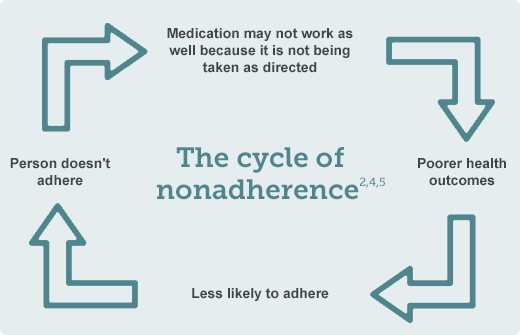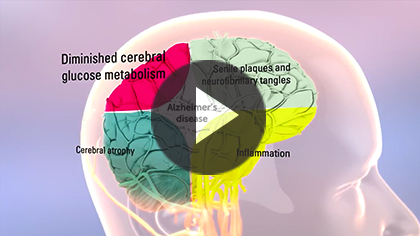Using multiple Alzheimer’s therapies
Available therapies for Alzheimer’s1,2
 There are several prescription treatments available for people who have Alzheimer’s disease. These medications can work by slowing the progression of symptoms and possibly controlling some of the behavioral changes that are caused by the disease. There is also Axona, a non-drug prescription therapy available for people with Alzheimer’s. It’s important to know that none of these options can stop the disease.
There are several prescription treatments available for people who have Alzheimer’s disease. These medications can work by slowing the progression of symptoms and possibly controlling some of the behavioral changes that are caused by the disease. There is also Axona, a non-drug prescription therapy available for people with Alzheimer’s. It’s important to know that none of these options can stop the disease.
Tips for using multiple therapies3
Your loved one may be taking several therapies for Alzheimer’s, as well as for other conditions. It’s important to take steps to make sure your loved one is taking them safely and properly:
- Know the therapies – Talk to the doctor or pharmacist to help understand why the therapy is being taken, when it is supposed to be taken, what the side effects are, and whether it can be safely taken with other therapies
- Keep track – People with Alzheimer’s often have trouble keeping track of their therapies. You can help by putting pills in a pillbox, setting reminders, and watching closely to ensure that your loved one takes each dose. You should also keep a complete list of the therapies your loved one takes
- Be safe – If your loved one has trouble swallowing, check with your doctor to see if pills can be chewed or crushed. Also, make sure that all therapies are locked up when not being used and are properly labeled
Nonadherence is an important consideration4
If your loved one is taking several medications, it is important that he or she is following all of the doctor's instructions. Sometimes, it becomes difficult to manage all of the therapies, which can lead to nonadherence.
Nonadherence is when a person doesn't follow the doctor's recommendations. For example, if a person is supposed to take a therapy twice a day but only takes it once a day, that person is nonadherent. Making sure your loved one takes his or her medications as directed is important, because not doing so can lead to poorer health outcomes.

Making sure someone takes his or her therapy as directed is an important consideration, especially for people with Alzheimer’s. If your loved one’s doctor is considering adding a therapy for Alzheimer’s, it’s important to talk to the doctor about any concerns you may have. Here are some questions you may want to ask. Will my loved one be ok taking more pills? Will my loved one have trouble swallowing his or her pills? What are the side effects of the new treatment?
Talking to a doctor before a new therapy is started may be helpful to keep your loved one on track with all of his or her therapies.
Learn about how to take Axona, a non-drug prescription therapy for people with mild to moderate Alzheimer’s.


